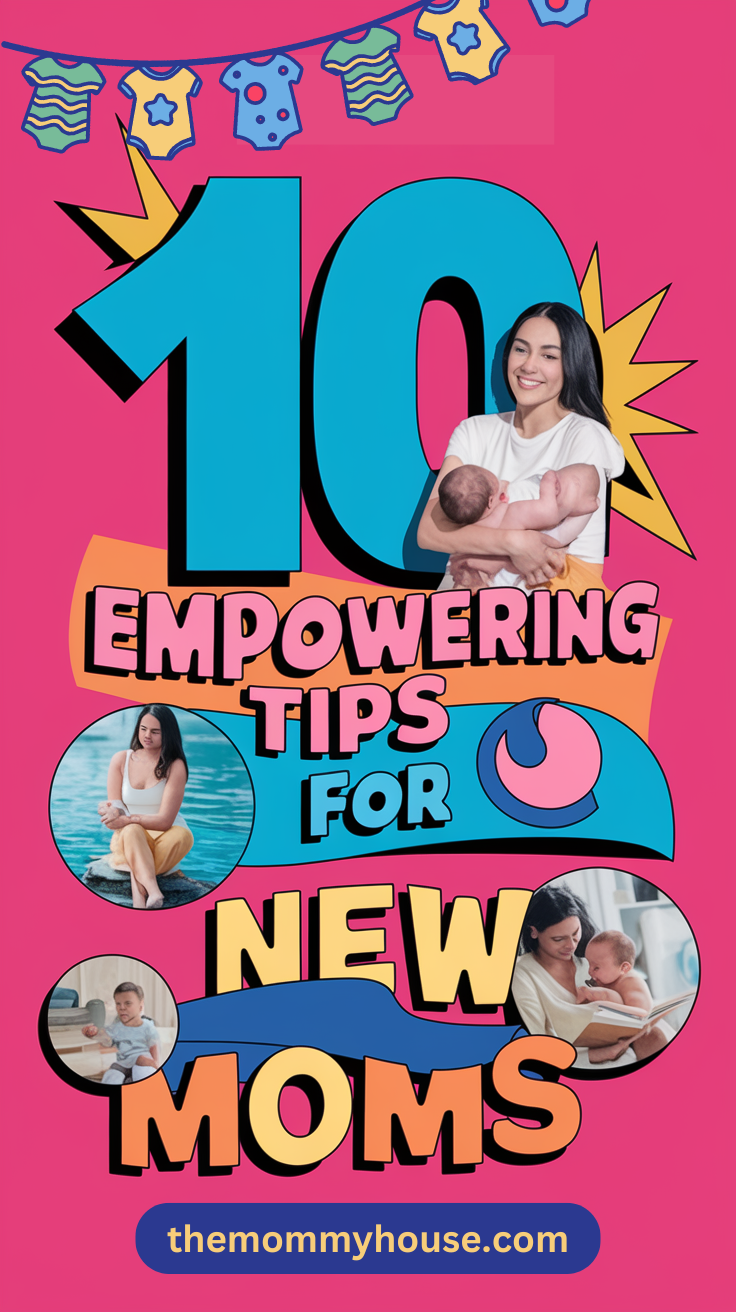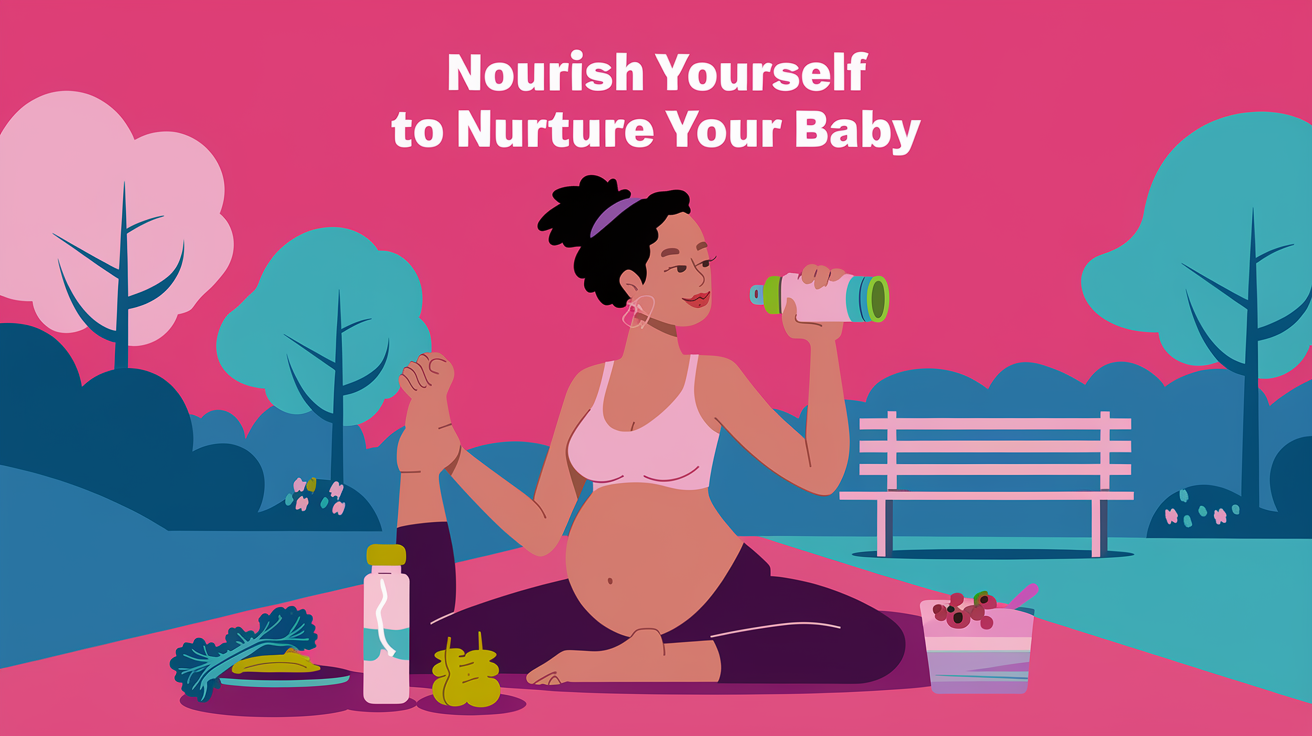Introduction: Embracing the Magic and Challenges of Motherhood

Welcome to the magical, sometimes overwhelming world of motherhood! Whether you’re a brand-new mom or a seasoned parent welcoming another child, this journey is unlike any other. As a new mom, you’re likely experiencing a whirlwind of emotions, from sheer joy to nervous anticipation. Motherhood is filled with countless learning opportunities, immense joys, and yes—challenges that test your patience and resilience.
This guide is designed to support you through these early days by offering essential advice, practical tips, and supportive insights that will empower you to navigate motherhood with confidence. From mastering the art of diaper changing to finding the elusive balance between self-care and baby care, we’ve got you covered. Let’s dive in and explore how you can make this transition into motherhood as smooth and fulfilling as possible.
Self-Care Tips for New Moms
The Importance of Self-Care for New Moms

Self-care often gets shuffled to the bottom of the to-do list for new moms, drowned out by the demands and joys of caring for a newborn. However, maintaining your well-being is paramount—not just for you but for your baby as well. When you’re well-rested, emotionally balanced, and physically healthy, you manage stress better and enjoy motherhood more. On the flip side, neglecting self-care can lead to burnout, resentment, and even postpartum depression, all of which can impact your ability to care for your child.
Remember, self-care isn’t a luxury; it’s an essential part of being a good mother. By prioritizing your well-being, you’re setting a strong foundation for a healthy, happy family life.
Simple Self-Care Practices for Busy Moms
Finding time for self-care might seem impossible amidst the whirlwind of motherhood, but it’s all about integrating small practices into your daily routine. Here are some quick and effective self-care strategies:
- Quick Meditation Sessions: Start or end your day with 5 minutes of meditation. Apps like Calm or Headspace can guide you; even a few moments of quiet reflection can reset your mood and stress levels.
- Stay Hydrated and Eat Well: It’s easy to forget the basics like drinking water when you’re focused on your baby. Keep a water bottle handy to ensure you stay hydrated. Eating nutritious meals, even simple ones, can significantly boost your energy levels.
- Exercise Regularly: A short walk with your baby in the stroller or a quick yoga session during naptime can make a big difference in your physical and emotional well-being.
- Connect with Friends: Maintaining friendships and seeking support from peers can provide emotional comfort and a sense of community, reminding you that you’re not alone in this journey.
- Sleep Adequacy: Sleep when the baby sleeps. It’s an old piece of advice, but it’s crucial. Align your rest with your baby’s to maximize your sleep hours.
- Journaling: Spend a few minutes each day writing down your thoughts and feelings. Journaling can serve as a therapeutic outlet and a future reminder of these precious, fleeting days.
Advanced Self-Care Strategies
For moms who can carve out a little more time for themselves, these advanced self-care strategies can elevate your overall well-being:
- Mindful Mornings: Start your day with a few minutes of mindfulness. This could include stretching, deep breathing exercises, or simply sipping your coffee in peace while focusing on your intentions for the day.
- Creative Outlets: Engage in a creative activity that you love, whether it’s painting, knitting, writing, or gardening. Creative expression can be incredibly therapeutic and offer a mental escape from the routine.
- Scheduled ‘Me Time’: Block out specific times during the week where you can do something just for you. This could be a solo outing, a long bath, or even just uninterrupted time to read a book.
- Pampering Sessions: Occasionally treat yourself to a spa day or an at-home pampering session. A little bit of indulgence can go a long way in lifting your spirits.
- Learning Something New: Engage in a new hobby or take an online course. Continuing to grow and learn keeps your mind sharp and gives you something exciting to focus on outside of motherhood.
Self-Care Myths Debunked
- Myth 1: Self-Care is Selfish: This couldn’t be further from the truth. Taking care of yourself ensures that you’re able to take better care of your baby. It’s about maintaining your own health and well-being so you can be the best mom you can be.
- Myth 2: Self-Care Requires a Lot of Time: Self-care doesn’t have to be time-consuming. Even 10 minutes of dedicated ‘me time’ can make a significant difference in your mood and energy levels.
- Myth 3: Self-Care is All About Pampering: While pampering is a part of self-care, it’s also about the basics like eating well, getting enough sleep, and staying active. It’s about taking care of your physical, mental, and emotional needs.
Real-Life Stories from Moms Who Prioritized Self-Care

Hearing from other moms who have successfully integrated self-care into their lives can be incredibly inspiring. Here are a few stories:
- Sarah’s Story: “As a new mom, I felt guilty about taking time for myself. But after my third child, I realized I needed that time to recharge. I started with just 10 minutes of yoga each day and gradually added more self-care practices. It made a world of difference in my mood and energy levels.”
- Emma’s Story: “I struggled with postpartum depression after the birth of my first child. Seeking help and prioritizing my mental health was the best decision I made. Self-care, for me, meant regular therapy sessions and connecting with a support group.”
- Jessica’s Story: “I learned the hard way that neglecting self-care leads to burnout. Now, I make sure to have ‘me time’ every evening after the kids are in bed. It’s my time to unwind and reflect on the day.”
Bonding with Your Baby
Understanding the Importance of Bonding

Bonding with your baby is one of the most beautiful aspects of motherhood. This connection goes beyond the immediate joy it brings; it has profound implications for your child’s emotional and physical development. The early bond you form with your baby lays the foundation for their ability to communicate, learn, and form relationships later in life.
Studies show that babies who experience strong bonds with their parents tend to have better self-esteem, lower anxiety levels, and a more secure attachment style as they grow. For mothers, this deep connection can also reduce the risk of postpartum depression and lead to a more fulfilling parenting experience.
How Bonding Affects Baby’s Development
The science behind bonding is fascinating. When you bond with your baby, several things happen:
- Brain Development: Physical touch, eye contact, and responsive caregiving stimulate your baby’s brain development. The first few years are crucial for neural connections, and bonding plays a significant role in shaping your baby’s brain.
- Emotional Security: Babies who feel securely attached to their parents are more likely to explore their environment, develop independence, and form healthy relationships later in life.
- Reduced Stress: Bonding activities like skin-to-skin contact, gentle rocking, and soothing voices help reduce stress in your baby. When babies feel secure, their stress hormone levels decrease, leading to better sleep, digestion, and overall health.
- Communication Skills: Early bonding activities like talking, singing, and reading to your baby help build their language skills. Even though your baby may not understand the words, the sound of your voice and the rhythm of language play a crucial role in their cognitive development.
Everyday Activities to Enhance Bonding
Bonding doesn’t have to be a grand gesture; it’s the small, everyday activities that build a strong connection. Here are some simple ways to enhance bonding with your baby:
- Skin-to-Skin Contact: Holding your baby close, especially in the early weeks, promotes warmth, security, and emotional connection. This can be done during feeding, after a bath, or simply while cuddling.
- Eye Contact: Make eye contact while feeding, talking, or playing with your baby. This not only strengthens your bond but also helps in developing your baby’s visual and social skills.
- Talk and Sing to Your Baby: Your voice is one of the most comforting sounds to your baby. Narrate your day, sing lullabies, or even read aloud—your baby will love the sound and rhythm of your voice.
- Gentle Massage: Giving your baby a gentle massage can be a soothing bonding experience. It helps your baby relax, improves circulation, and provides comfort through touch.
- Playtime: Engage in simple play activities like peek-a-boo or tummy time. These interactions stimulate your baby’s senses and help in physical and cognitive development.
The Science Behind Baby Bonding

Understanding the science behind bonding can help you appreciate its importance even more. Here’s a brief look at what happens when you bond with your baby:
- Oxytocin Release: Often called the “love hormone,” oxytocin is released in both you and your baby during bonding activities like breastfeeding, cuddling, and skin-to-skin contact. This hormone strengthens emotional connection and promotes feelings of love and trust.
- Endorphins: Bonding activities also trigger the release of endorphins, which are natural painkillers and mood enhancers. These hormones help both you and your baby feel calm and content.
- Secure Attachment: Consistent bonding helps establish a secure attachment style, where your baby feels safe and confident to explore their world. This secure attachment is crucial for emotional health and resilience as your child grows.
Personal Experiences: Stories from Real Moms
Hearing from other moms can provide both reassurance and inspiration. Here are a few bonding stories shared by real mothers:
- Sophia’s Story: “With my first baby, I was nervous and unsure about everything. But I found that just holding her close and talking to her helped us both feel more connected. It was in those quiet moments that I felt the bond growing stronger every day.”
- Lena’s Story: “For me, breastfeeding was a significant bonding experience. Even though it was challenging at first, the closeness we shared during those feeding sessions was irreplaceable. It was our special time to connect.”
- Maria’s Story: “I made it a point to have skin-to-skin time with my baby every day, even if it was just for a few minutes. It became our little ritual, and I noticed how calm and content she became during those moments. It was a beautiful way to bond.”
Establishing a Routine
Why Routines Matter
Establishing a routine can be a lifesaver for new moms. While it might seem restrictive at first, a consistent routine provides a sense of stability for both you and your baby. Routines help your baby understand what to expect, which can reduce fussiness and make transitions, like bedtime, much smoother. For moms, a routine can bring a sense of control and predictability in the often chaotic world of newborn care.
A well-established routine also helps in tracking your baby’s needs. Whether it’s feeding times, naps, or playtime, having a routine makes it easier to recognize and respond to your baby’s cues. Over time, this can lead to a more harmonious daily life, with both you and your baby knowing what to expect next.
Tips for Creating a Routine
Creating a routine doesn’t have to be rigid or complicated. Start with simple activities and gradually build a schedule that works for both you and your baby. Here are some tips:
- Start Small: Begin by establishing a few key parts of your day, like feeding and napping times. Once these are consistent, you can start adding more activities.
- Be Flexible: Babies are unpredictable, so it’s important to remain flexible. If your baby is having a particularly fussy day, don’t stress about sticking to the routine. Adapt as needed.
- Follow Your Baby’s Cues: Pay attention to your baby’s natural rhythms and preferences. For example, if they tend to get sleepy around a certain time, incorporate that into your routine.
- Create a Bedtime Ritual: Bedtime routines are particularly important. A consistent routine, such as a bath, feeding, and a lullaby, can signal to your baby that it’s time to sleep.
- Include Play and Bonding Time: Make sure to include time for play and bonding in your daily routine. This is important for your baby’s development and your relationship.
Examples of Effective Routines
Every family is different, so your routine should fit your unique needs. Here are a few examples of daily routines for inspiration:
- Morning Routine: Wake up, diaper change, feeding, playtime, and nap.
- Afternoon Routine: Feeding, outdoor walk, tummy time, nap.
- Evening Routine: Feeding, bath time, storytime, bedtime.
How to Adjust Routines as Your Baby Grows
As your baby grows, their needs will change, and so will their routine. Here’s how to adjust:
- Monitor Growth and Development: As your baby reaches new milestones, like starting solid foods or dropping naps, adjust the routine to accommodate these changes.
- Gradually Introduce New Activities: Introduce new activities or changes gradually, so your baby has time to adjust. For example, if you’re transitioning from breastfeeding to bottle feeding, do it slowly.
- Stay Attuned to Your Baby’s Needs: Continuously observe your baby’s behavior and adjust the routine as necessary. For instance, if your baby is becoming more active, increase playtime.
Balancing Flexibility and Consistency
Finding the balance between being flexible and maintaining consistency is key to a successful routine. While it’s important to have a structure, being too rigid can lead to stress for both you and your baby. Allow yourself the grace to deviate from the routine when needed—whether it’s a special outing or your baby just needs some extra cuddles.
Managing Sleep Deprivation
The Reality of Sleep Deprivation

Sleep deprivation is one of the most challenging aspects of early motherhood. The demands of a newborn, coupled with the constant worry and responsibility, often mean that a good night’s sleep becomes a distant memory. Lack of sleep can affect your mood, cognitive function, and overall health, making it harder to enjoy and cope with the demands of motherhood.
It’s important to acknowledge that sleep deprivation is normal during this phase, and it’s okay to ask for help. Understanding the effects of sleep deprivation and learning how to manage it can make a significant difference in your well-being.
Strategies to Cope with Sleep Loss
While you may not be able to eliminate sleep deprivation, there are strategies you can use to cope with it:
- Nap When the Baby Naps: This classic advice holds true—try to rest when your baby does, even if it’s just for a short nap. Accumulating small amounts of sleep throughout the day can help you feel more rested.
- Accept Help: Don’t hesitate to ask your partner, family, or friends to help with the baby so you can rest. Accepting help doesn’t mean you’re not capable—it means you’re taking care of yourself so you can be at your best.
- Prioritize Sleep: Whenever possible, prioritize sleep over other activities. It’s tempting to use baby’s nap time to catch up on chores, but your rest is more important. The dishes can wait; your health can’t.
- Create a Sleep-Friendly Environment: Make your sleep environment as comfortable as possible. Use blackout curtains, white noise machines, or sleep masks to create a peaceful atmosphere conducive to sleep.
- Practice Relaxation Techniques: Techniques like deep breathing, meditation, or gentle stretching before bed can help relax your body and mind, making it easier to fall asleep.
Related:
15 Essential Breastfeeding Tips Every New Mom Should Know
Improving Sleep Quality
Quality matters as much as quantity when it comes to sleep. Here are ways to improve the quality of your sleep, even if it’s limited:
- Consistent Sleep Schedule: Try to go to bed and wake up at the same time every day, even on weekends. Consistency helps regulate your body’s internal clock, making it easier to fall asleep and wake up naturally.
- Limit Screen Time Before Bed: The blue light from screens can interfere with your body’s production of melatonin, the hormone that regulates sleep. Try to avoid screens at least an hour before bedtime.
- Avoid Caffeine and Heavy Meals Before Bed: Caffeine and heavy meals can disrupt your sleep. Opt for light snacks and herbal teas that promote relaxation.
- Practice Bedtime Rituals: Just like your baby, you can benefit from a bedtime routine. Whether it’s reading a book, taking a warm bath, or listening to calming music, find activities that help signal to your body that it’s time to sleep.
Conclusion
Becoming a new mom is a journey filled with both joy and challenges. From the initial moments of bonding with your baby to navigating sleep deprivation, each experience helps you grow as a parent. Remember that building a strong bond with your baby lays the foundation for their emotional and psychological development, and establishing a routine can bring much-needed stability to your day-to-day life. While sleep deprivation is a tough reality, there are strategies to help you cope and improve your well-being.
Take things one step at a time, and remember to be kind to yourself. You’re not alone in this journey—lean on your support system, ask for help when you need it, and embrace the beautiful chaos of motherhood. The bond you’re creating with your baby is priceless, and with each passing day, you’ll grow more confident in your role as a mom.
FAQ
Q: How early should I start bonding with my baby?
A: Bonding can begin as early as during pregnancy, but it intensifies after birth. Skin-to-skin contact, talking, and responding to your baby’s needs are great ways to start bonding right away.
Q: What if I don’t feel an immediate bond with my baby?
A: It’s normal not to feel an instant bond. Bonding is a process that develops over time through consistent care and interaction. Don’t worry if it takes a little longer—it will come naturally.
Q: How can I balance a routine with my baby’s unpredictable needs?
A: Flexibility is key. Establish a loose routine based on your baby’s natural rhythms, but be prepared to adapt as needed. It’s okay if things don’t go according to plan every day.
Q: What are some signs that my baby is securely attached to me?
A: Signs of secure attachment include your baby seeking comfort from you, making eye contact, smiling when they see you, and showing distress when you leave the room.
Q: How can I improve the quality of my sleep while caring for a newborn?
A: Focus on creating a sleep-friendly environment, practicing relaxation techniques before bed, and taking naps when your baby sleeps. Also, avoid screens and caffeine before bedtime to improve sleep quality.
References
- Smith, L. (2023). The Power of Touch: How Bonding Affects Baby Development. Parenting Today Journal.
- Johnson, R. (2022). Understanding Newborn Sleep Patterns and How to Establish Routines. Sleep and Parenting Studies.
- Williams, K. (2021). Coping with Sleep Deprivation as a New Parent. Journal of Maternal Health.
- American Academy of Pediatrics. (2024). Bonding with Your Baby: What Every Parent Should Know. AAP Parenting Resources.

Pingback: How to Bathe a Newborn: A Gentle, Step-by-Step Guide to Your Baby's First Baths -